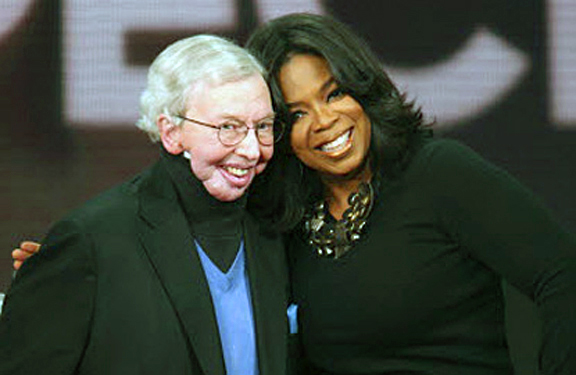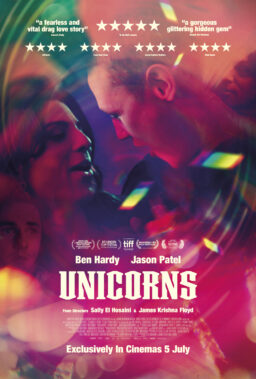To borrow a line from “Citizen Kane,” I knew Oprah before the beginning, and now I know her after the end. The remaining episodes of her show bring to a close the most phenomenal run of any talk show host in history and ring down the curtain on the second act of a life that seems poised to have many more. What lies ahead? Her new cable network, we know. But I suspect she also has a future in high public office.
Gene Siskel and I met Oprah in Baltimore, when she was in her early 20s and hosting a morning talk show. Then she moved to WLS-Channel 7 in Chicago, went up against the ruling Phil Donahue, dethroned him in three months, and went on to become a superstar with (for some) elements of earth mother and deity.
Curious about some of the feelings she is having at this time, I sent Oprah some questions. Here are her replies:
Q. The novel Miss Lonelyhearts was about the author of an advice column who began to crumble under the weight of his readers’ problems. How do you survive the depth of suffering of some of your guests?
A. I used to take in and FEEL EVERYTHING. I could literally feel people’s energy. Their nervousness. Anxiety, pain. Years ago, I complained to the executive producer how feeling everyone’s pain was making me sick. And she replied: “Then you need to stop doing that.” So I did. I made a conscious effort to listen and not absorb the pain. Not take it on, but hear it, empathize and LET IT GO.
Q. I believe you started out with a career and ended up with a vocation. If you agree with that at all, did the transition catch you rather by surprise?
A. Very much so. Everyone would be surprised at how little I knew about ANYthing when I first came to Chicago. Every decision was made on instinct.
Q. Your Chicago shows began with the standard TV morning show studio format. Today I can’t imagine your program without a studio audience. How did the studio audience evolve, and how do you relate to it?
A. I was accustomed to an audience, though tiny (24), in Baltimore. I was so thrilled to have the “A.M. Chicago” job, I forgot to ask my boss Dennis Swanson, “What is the format? And do you have an audience?” After the first day with no audience, we started asking the secretaries to sit in on folding chairs. Then we expanded to going on State Street and begging people to come in “get warm and watch the show.” I knew I worked better connecting to real people in front of me. It felt more like sharing the experience rather than being the experience.
Q. Do you monitor your behavior because you are such an influential model for so many people? Many celebrities lead appalling lives. Not you.
A. Nope. Fame is such an interesting dynamic. It’s determined by other people’s view of you. I became famous for being Myself. I’d be the same Self, no matter what I was doing. For many years I thought I’d be a teacher. And had visions of getting the Teacher of the Year award.
Q. Will the Oprah Winfrey Network broaden out from health and counseling sorts of programs to include news, sitcoms and other formats?
A. I want to create programming 24/7 that wakes people up. And use whatever format it takes to do it.
Q. On TV, I saw you weeping at Grant Park during Obama’s Election Night speech. I sensed at that moment something more than simply joy. I felt something very deep within you had been accessed.
A. For sure. There’s a Negro spiritual: “Wouldn’t Take Nothin’ for My Journey Now.” I was thinking about the journey. His and mine and the collective Ours; the sacrifices and prayers, marches, sit-ins and lynchings. I was thinking about my grandmother, who spent her whole life in acceptance of segregation and oppression, not imagining it could be any other way. I was thinking of Martin L. King and the countless others who dared believe it could. I was thinking of the spiritual and emotional impact of his victory on the world.
Q. At the movies, I think many people cry more when they see goodness than when they see sadness. Why is that?
A. Because we are innately good, and the goodness we see that makes us cry is just a mirror of ourselves. Hits our goodness nerve.
Q. You have created your own environment and never been absorbed into “show biz” in the sense we associate with the coasts. Did Chicago help your focus?
A. Chicago represented the very Heart of America. If I’d moved the show to L.A., the energy of show biz would have impacted the show. The “let’s do lunch crowd,” agents, wheeling, manipulating and negotiating. Producers would have had to deal with all of that, instead of the steady focus and sacrifice that was required to keep raising the bar for ourselves.
Q. Gene Siskel’s inevitable question: What do you know for sure?
A. I know for sure that the third law of motion in physics is real and is the rule of the world. For every action, there is an equal and opposite reaction. Being responsible for the energy you put out determines the energy returned. Or to quote Celie as she finally summoned the courage to leave Mister in The Color Purple, “Everything you even try to do to me, already done to you!”
Q. What do you think happens after death?
A. You drop your body and your soul joins the spiritual chorus of ALL there is. Many levels in the chorus. Where you stand in the chorus line is determined by how you live now. I think that Holly Hunter’s last words in the movie The Piano when she’s sinking to the depths of the ocean with the chain unraveling from the boat will be true for all of us: “Death. What a surprise!”












